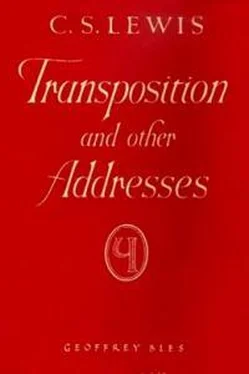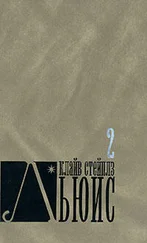I have already made it fairly clear that I think it better for you not to be that kind of man. But you may have an open mind on the question. I will therefore suggest two reasons for thinking as I do.
It would be polite and charitable, and in view of your age reasonable too, to suppose that none of you is yet a scoundrel. On the other hand, by the mere law of averages (I am saying nothing against free will) it is almost certain that at least two or three of you before you die will have become something very like scoundrels. There must be in this room the makings of at least that number of unscrupulous, treacherous, ruthless egotists. The choice is still before you: and I hope you will not take my hard words about your possible future characters as a token of disrespect to your present characters. And the prophecy I make is this. To nine out of ten of you the choice which could lead to scoundrelism will come, when it does come, in no very dramatic colours. Obviously bad men, obviously threatening or bribing, will almost certainly not appear. Over a drink or a cup of coffee, disguised as a triviality and sandwiched between two jokes, from the lips of a man, or woman, whom you have recently been getting to know rather better and whom you hope to know better still—just at the moment when you are most anxious not to appear crude, or naif or a prig—the hint will come. It will be the hint of something which is not quite in accordance with the technical rules of fair play: something which the public, the ignorant, romantic public, would never understand: something which even the outsiders in your own profession are apt to make a fuss about: but something, says your new friend, which "we"—and at the word "we" you try not to blush for mere pleasure—something "we always do". And you will be drawn in, if you are drawn in, not by desire for gain or ease, but simply because at that moment, when the cup was so near your lips, you cannot bear to be thrust back again into the cold outer world. It would be so terrible to see the other man's face—that genial, confidential, delightfully sophisticated face—turn suddenly cold and contemptuous, to know that you had been tried for the Inner Ring and rejected. And then, if you are drawn in, next week it will be something a little further from the rules, and next year something further still, but all in the jolliest, friendliest spirit. It may end in a crash, a scandal, and penal servitude: it may end in millions, a peerage and giving the prizes at your old school. But you will be a scoundrel.
That is my first reason. Of all passions the passion for the Inner Ring is most skilful in making a man who is not yet a very bad man do very bad things.
My second reason is this. The torture allotted to the Danaids in the classical underworld, that of attempting to fill sieves with water, is the symbol not of one vice but of all vices. It is the very mark of a perverse desire that it seeks what is not to be had. The desire to be inside the invisible line illustrates this rule. As long as you are governed by that desire you will never get what you want. You are trying to peel an onion: if you succeed there will be nothing left. Until you conquer the fear of being an outsider, an outsider you will remain.
This is surely very clear when you come to think of it. If you want to be made free of a certain circle for some wholesome reason—if, say, you want to join a musical society because you really like music—then there is a possibility of satisfaction. You may find yourself playing in a quartet and you may enjoy it. But if all you want is to be in the know, your pleasure will be short–lived. The circle cannot have from within the charm it had from outside. By the very act of admitting you it has lost its magic. Once the first novelty is worn off the members of this circle will be no more interesting than your old friends. Why should they be? You were not looking for virtue or kindness or loyalty or humour or learning or wit or any of the things that can be really enjoyed. You merely wanted to be "in". And that is a pleasure that cannot last. As soon as your new associates have been staled to you by custom, you will be looking for another Ring. The rainbow's end will still be ahead of you. The old Ring will now be only the drab background for your endeavour to enter the new one.
And you will always find them hard to enter, for a reason you very well know. You yourself, once you are in, want to make it hard for the next entrant, just as those who are already in made it hard for you. Naturally. In any wholesome group of people which holds together for a good purpose, the exclusions are in a sense accidental. Three or four people who are together for the sake of some piece of work exclude others because there is work only for so many or because the others can't in fact do it. Your little musical group limits its numbers because the rooms they meet in are only so big. But your genuine Inner Ring exists for exclusion. There'd be no fun if there were no outsiders. The invisible line would have no meaning unless most people were on the wrong side of it. Exclusion is no accident: it is the essence.
The quest of the Inner Ring will break your hearts unless you break it. But if you break it, a surprising result will follow. If in your working hours you make the work your end, you will presently find yourself all unawares inside the only circle in your profession that really matters. You will be one of the sound craftsmen, and other sound craftsmen will know it. This group of craftsmen will by no means coincide with the Inner Ring or the Important People or the People in the Know. It will not shape that professional policy or work up that professional influence which fights for the profession as a whole against the public: nor will it lead to those periodic scandals and crises which the Inner Ring produces. But it will do those things which that profession exists to do and will in the long run be responsible for all the respect which that profession in fact enjoys and which the speeches and advertisements cannot maintain. And if in your spare time you consort simply with the people you like, you will again find that you have come unawares to a real inside: that you are indeed snug and safe at the centre of something which, seen from without, would look exactly like an Inner Ring. But the difference is that its secrecy is accidental, and its exclusiveness a by–product, and no one was led thither by the lure of the esoteric: for it is only four or five people who like one another meeting to do things that they like. This is friendship. Aristotle placed it among the virtues. It causes perhaps half of all the happiness in the world, and no Inner Ringer can ever have it.
We are told in Scripture that those who ask get. That is true, in senses I can't now explore. But in another sense there is much truth in the schoolboy's principle "them as asks shan't have." To a young person, just entering on adult life, the world seems full of "insides", full of delightful intimacies and confidentialities, and he desires to enter them. But if he follows that desire he will reach no "inside" that is worth reaching. The true road lies in quite another direction. It is like the house in Alice Through the Looking Glass .











